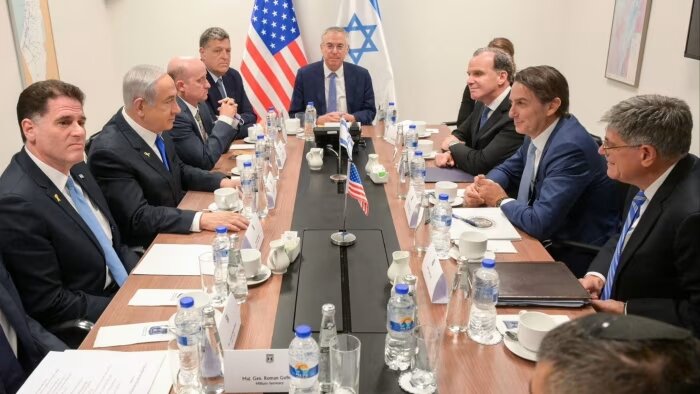Ceasefire charade US seeks to divert attention from Israels carnage in Lebanon
Ceasefire charade: US seeks to divert attention from Israel's carnage in Lebanon
TEHRAN- More than a month into Israel’s brutal strikes on Lebanon, the United States' efforts for a ceasefire appear to be nothing more than a distraction from the Tel Aviv regime’s carnage and destruction in the Mediterranean nation.

US President Joe Biden’s Middle East adviser Brett McGurk and special envoy Amos Hochstein were in Israel on Thursday.
They met with senior officials including Prime Minister Benjamin Netanyahu, war minister Yoav Gallant, Shin Bet director Ronan Bar and Mossad chief David Barnea.
US Secretary of State Antony Blinken said Thursday’s talks had made "good progress" on a potential deal.
But Israel’s relentless strikes on Lebanon indicate a different reality. On Friday morning, Israel pummeled Beirut's southern suburbs with at least 10 strikes, according to Reuters.
Lebanon’s Prime Minister Najib Mikati says renewed attacks on Beirut signal Israeli rejection of a US-drafted ceasefire. The Lebanese prime minister, meanwhile, signaled that the expansion of Israel’s attacks amounts to throwing cold water on peace efforts.
“[Israel’s] repeated threats to the population to evacuate entire cities and villages, and its renewed targeting of the southern suburbs of Beirut with destructive raids, are all indicators that confirm the Israeli enemy’s rejection of all efforts being made to secure a ceasefire,” Najib Mikati said in a statement.
The premier denied reports that the US had requested Lebanon announce a unilateral ceasefire with Israel, stating that the Lebanese government remains committed to a bilateral ceasefire.
Devious diplomacy
An Israeli broadcaster published a US-drafted agreement for an initial two-month ceasefire on Wednesday.
According to Kan, the Israeli army would withdraw from Lebanon within a week. The Lebanese army would also be deployed along the border in southern Lebanon and Hezbollah would end its military presence in the area.
The truce is believed to be in line with efforts to fully implement UN Resolution 1701 that ended the 2006 war between Israel and Lebanon.
Israel appears unwilling to comply with this resolution. Reports indicate that Israel seeks the authority to target Hezbollah even following the conclusion of the conflict.
War on Lebanon
Israel started launching a massive bombing campaign in Lebanon more than a month ago.
Since the start of the massive airstrikes on September 23, Israel has slaughtered at least 2,200 people in Lebanon and displaced 1.2 million others, according to the country’s Health Ministry.
Israel has killed at least 2,200 people in Lebanon since September 23. Israel also launched a ground invasion of southern Lebanon on October 1. According to an analysis of satellite data by The Washington Post, nearly a quarter of all buildings in 25 Lebanese municipalities near the border with Israel have been damaged or destroyed since last Saturday.
The analysis indicates that at least 5,868 buildings have been damaged or destroyed, including nearly half of structures in the two hardest-hit areas, Ayta al-Shab and Kfar Kila. It suggests that the vast majority of the damage — almost 80 percent — has occurred a day after Israel launched the ground invasion.
Hezbollah and Israel began trading fire a day after the regime launched war on Gaza on October 7 last year. The resistance movement has carried out strikes against Israel in solidarity with Palestinians in Gaza.
Tens of thousands of people have also been displaced from border areas in northern Israel and southern Lebanon over the course of the Gaza war.
The Netanyahu regime says its war on Lebanon is aimed at returning the evacuated people to northern Israel.
Hezbollah has stressed that its strikes on Israel won’t stop unless it ends the Gaza onslaught and aggression on Lebanon.
Hezbollah’s newly-elected Secretary-General Sheikh Naim Qassem warned on Wednesday that the group is ready for a long war with Israel. Qassem was named as Hezbollah leader a day earlier succeeding Sayyed Hassan Nasrallah who was assassinated in an Israeli airstrike on Beirut’s suburb of Dahieh on September 27. US media acknowledged that Israel used American-made 900kg (2,000-pound) bombs in the strike.
The Washington Post says Israel has damaged or destroyed nearly a quarter of buildings in southern Lebanon. US-supplied weapons utilized by Israel in its strikes on Lebanon continue to claim the lives of more Lebanese civilians.
On the one hand, the US claims that it is pushing for a ceasefire to end the conflict in Lebanon. On the other hand, its weapons result in the death of Lebanese people.
If the US was sincere in establishing a ceasefire, it would stop the flow of weapons to Israel and use its leverage at the United Nations Security Council to stop the Israeli war machine.
Washington’s peace gesture is a smokescreen to redirect international focus from Israel's brutal bombings in Lebanon and its involvement in the regime's atrocities against the population there.
The peace initiative is also aimed at mitigating growing domestic anger at Israel’s warmongering and brutalities ahead of the presidential election in the United States.
source: tehrantimes.com